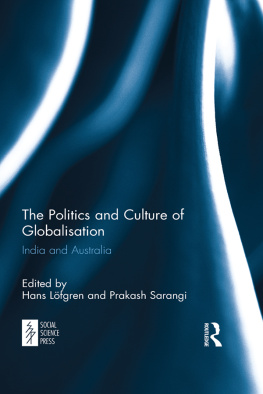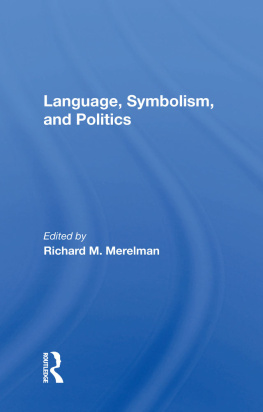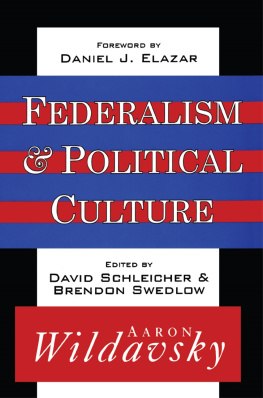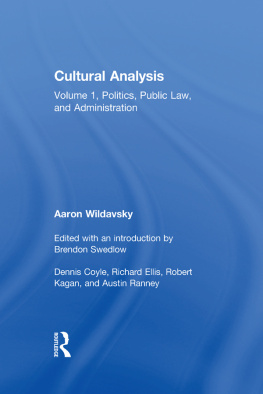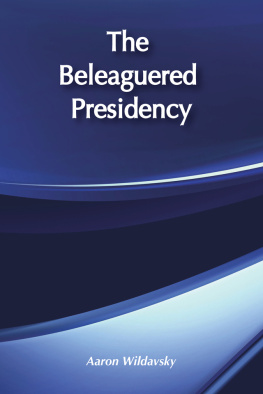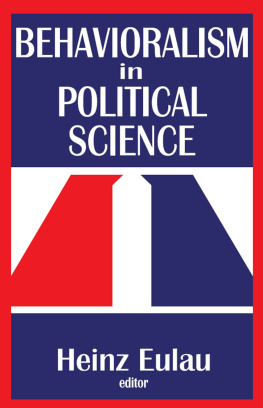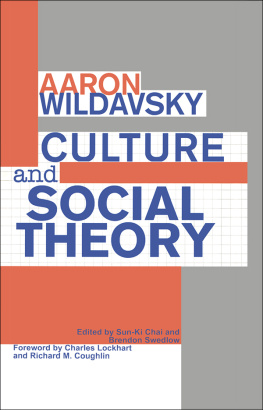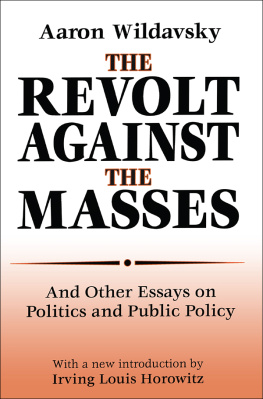First published 1997 by Westview Press
Published 2018 by Routledge
711 Third Avenue, New York, NY 10017, USA
2 Park Square, Milton Park, Abingdon, Oxon OX14 4RN
Routledge is an imprint of the Taylor & Francis Group, an informa business
Copyright 1997 Taylor & Francis
All rights reserved. No part of this book may be reprinted or reproduced or utilised in any form or by any electronic, mechanical, or other means, now known or hereafter invented, including photocopying and recording, or in any information storage or retrieval system, without permission in writing from the publishers.
Notice:
Product or corporate names may be trademarks or registered trademarks, and are used only for identification and explanation without intent to infringe.
Library of Congress Cataloging-in-Publication Data
Culture matters : essays in honor of Aaron Wildaysky / edited by
Richard J. Ellis and Michael Thompson.
p. cm.
Includes bibliographical references and index.
ISBN 0-8133-3117-X (hc) ISBN 0-8133-3118-8 (pbk)
1. Political culture. 2. Culture. I. Wildaysky, Aaron B.
II. Ellis, Richard (Richard J.) III. Thompson, Michael.
JA75.7.C87 1997
ISBN 13: 978-0-8133-3118-8 (pbk)
Contents
Gabriel A. Almond
, Michael Thompson and Richard J. Ellis
Part I
Rational Choice and Cultural Choice
, Harry Eckstein
Sun-Ki Chai
Part II
Institutions and Culture
, Dennis J. Coyle
, Vincent Ostrom and Elinor Ostrom
Part III
Cultural Theories of Change
, Charles Lockhart
, Arthur L. Stinchcombe
Part IV
Risk and Culture
, Mary Douglas
Howard Margolis
Part V
Culture and the Environment: Empirical Studies
, Gunnar Grendstad and Per Selle
, Richard J. Ellis and Fred Thompson
Part VI
Cultural Theory and Practical Policies
, Robert Klitgaard
, Michael Thompson
GABRIEL A. ALMOND
Like the mythical phoenix that rises from its ashes, political culture rises intermittently from the reductionist ashes to which its antagonists consign it. There have been four creative periods and about a half dozen reductionist episodes in the intellectual history of political culture. It has been on a positive and creative course for several decades, and the signs are for continued creativity.
Reductionism No. 1: Christianity. When Christianity conquered the classical world of Greece and Rome, the works of Herodotus, Plato, Aristotle, Polybius, and Plutarch, among others, with their insights into the differences among cities, nations, elites, and leaders, were lost to view in a homogenization of thought that divided humankind into the gross categories of the saved and the damned. It took the Islamic world in its secular and cosmopolitan moment, almost a thousand years later, to dust off the classics and make them available to a reawakening Europe. These rediscovered classics fed into the Renaissance, reviving speculation about the cultures and institutions of cities and nations, past and present, their causes and consequences. Thus Machiavellis Prince and Discourses on Livy rehabilitated the classical insights into culture and personality, the conditions that shape them, and their consequences.
Systematic recognition of the importance of national differences reached a high point in the work of French Enlightenment philosophe Montesquieu. His Essay on Causes Affecting Minds and Characters first fully broached these themes in modern times, and his The Spirit of Laws fully elaborated a theory of national character.
Men are influenced by various causes, he observed in his famous Book XIX of The Spirit of Laws, by the climate [he has additional chapters in the Essay on Causes that deal with other physical factors, such as soil, terrain, food, and the like], the religion, the laws, the maxims of government, by precedents, morals and customs, from whence is formed a general spirit that takes its rise from these. In proportion, as in every nation any one of these causes acts with more force, the others are in the same degree weak. Nature and the climate rule almost alone over the savages; customs govern the Chinese; the laws tyrannize in Japan; morals had formerly all their influence at Sparta, maxims of government, and the ancient simplicity of manners, once prevailed at Rome (1977, 287).
Durkheim, stressing his multicausal approach to cultural explanation as well as his functionalism, viewed Montesquieu as the father of modern social science (1965, 5657). Montesquieu himself viewed his role as that of bringing to the study of history and human affairs the objectivity and rigor that Newton had brought to the study of the cosmos. It was Montesquieus analytic model that lay behind the social-scientific claims of the authors of the Federalist Papers. Montesquieus ideas constituted an important part of the intellectual heritage of Tocqueville, whose studies of eighteenth-century France and nineteenth-century America are perhaps the greatest classics of political culture research. Indeed, the contributions of both Montesquieu and Tocqueville to the theories of national character and political culture call for acknowledgment of the importance of the French connection (Montesquieu-Rousseau-Tocqueville-Durkheim) in these intellectual developments. For Montesquieu political culture was the spirit of the laws; for Tocqueville it was the habits of the heart.
Reductionisms Nos. 2, 3, 4: Historicism, Economism, Biologism. The nineteenth century was rich in reductionist interpretations. Enlightenment anticipation of the universal spread of rational-secular knowledge and culture was elaborated in the work of historicists such as Comte and Spencer. In this perspective cultural uniqueness tended to be viewed as residual, as comprising traditions doomed to be superseded by humane progress and secular culture.
Marxist materialism, in its various forms and permutations, was the most pervasive form of reductionism in the nineteenth and twentieth centuries. Marx himself allowed for national differences that would explain different forms and degrees of class struggle. The Netherlands and the United States, for example, because of their specific historical experiences, might escape the violence of the inevitable, proletarian-capitalist confrontation. Revisionist Marxism assumed a political learning process, rather than a necessary violent revolution, that might produce the desired socialist outcome. Lenin reduced national and cultural differences to strong and weak links in the imperialist-capitalist chain. But for all the varieties of Marxism class struggle was the engine that moved history. Culture was either residual, or it was the mirror of class structure.


